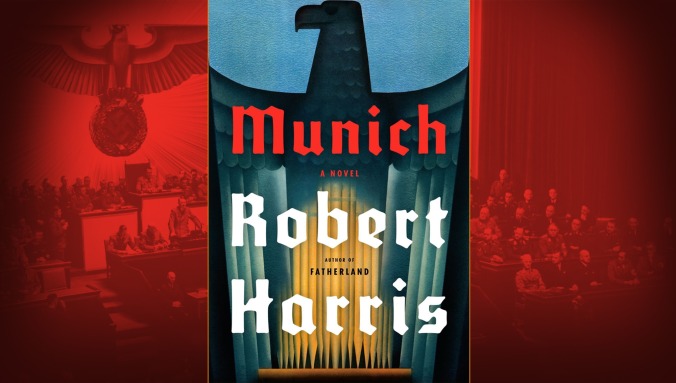An attempt to thwart Hitler through diplomacy is at the heart of the timely Munich
Aux Features Book Review
In 1992, Robert Harris wrote a popular novel of alternative history, Fatherland, a police thriller set a few decades after the Axis powers won the Second World War. Munich, his latest work, for a time seems to be premised in an alternative history of its own, one in which the war is stopped before it even gets started.
The book—grounded in real history, with real-life figures as major characters, but otherwise fiction—is set in the days leading up to the September 1938 Munich Agreement. This was a pact wherein, in exchange for allowing Germany to annex some Czechoslovakian territories populated mostly by German speakers, it seemed like Hitler’s ambitions might be sated, staving off his desires to take the territories (and more) militarily.
The agreement would be overshadowed and voided by the Nazi tanks rolling into Poland a year or so later; today it is mostly remembered as exhibit A in the case against Neville Chamberlain, the British prime minister who brokered the deal and has been cast by history as a notorious and unforgivable appeaser.
Munich, in large part, is Harris’ attempt to empathize with Chamberlain; the author depicts him as an honorable man and a canny statesman, though his options are limited by the cards he has to play. At one point he huffs that negotiations come down to “If! It’s always if!” Certainly his goal of preventing what would be the most destructive war the world would ever know—“one month at a time, one day at a time, if needs be”—is noble. Harris repeatedly underlines how Britons—desperate to avoid another major conflict, with World War I still a vivid memory, especially at a time of limited military preparedness, especially over something like Czechoslovakia—went apeshit in their admiration for their leader, throbbing the streets as every bit of concession he appears to extract from Hitler becomes known (interesting given that the typically vilified prime minister would get, between this and Darkest Hour, two sympathetic depictions in short succession at a time when the specter of Nazism seems more present than ever).
The book alternates its point of view from chapter to chapter, flipping between (fictional) lower-level figures on both sides of the negotiations. Hugh Legat is in the British diplomatic service and acts as a kind of aide to Chamberlain, though he’s more suspicious about Hitler’s general commitment and honor than his boss. In the other corner is Paul Von Hartmann of the German Foreign Office, a Third Reich skeptic who for a time debates a scheme to arrest his country’s leader. Later he will provide Legat, a college friend, with crucial information about Hitler’s ultimate intentions.
Such subplots, which feint toward Harris’ background writing thrillers rather than historical analysis (he also wrote The Ghost, which became Roman Polanski’s The Ghost Writer), are undeveloped and among the weaker elements of Munich, which otherwise hums along as an engaging and thoughtful work. It’s even somewhat moving, though that’s colored by the reader’s knowledge of how this optimistic pact ultimately failed; the thoughts it provokes are more due to “what if” speculation and not because of original insights. Legat and Von Hartmann’s relationship, especially when it gets into “there was a girl” clichés, also feels rote.
The book really works when it considers two principal themes, one lofty and the other purposefully mundane. The mundane one is Harris’ acute interest in the banal details of negotiating for days on end, how every major player is egocentric and superficial to a degree; neither Hitler nor Chamberlain want to be seen publicly wearing glasses, for example. The characters are perpetually exhausted, hungry, hungover, or annoyed by the weather, and these details carry an unusual amount of credibility and interest. It makes perfect sense, come to think of it, that in major historical moments, some bystander would be distracted by having stepped in a puddle or something.
The loftier theme is the real sense that Harris creates that events are happening faster than anyone anticipated, with no one able to stop them. “Was this what History felt like?” Legat wonders early on. “Germany would attack Czechoslovakia. France would declare war on Germany. Britain would support France. His children would wear gas masks. The diners at the Ritz would abandon their white linen tablecloths to crouch in slit trenches in Green Park. It was all too much to grasp.”
As with Stephen King’s 11/22/63, it almost feels as though the past itself is a character, one that can’t be changed or reasoned with. Would this all feel as resonant in another time, when people weren’t warning of history repeating itself in dark ways? It’s hard to say, but the book is here now, and much more than the entertaining romp Harris might have set out to write. It’s also a warning and a lament.
Purchasing Munich via Amazon helps support The A.V. Club.